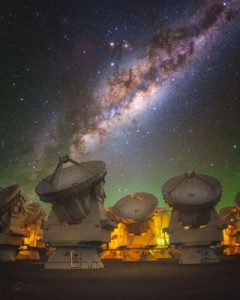
Editorial, Georgia News
Inside Notes: Our Vast Universe

Let’s get into something new for a few months; I’m sure everyone is tried of me ranting about politics, COVID-19 and such. All sane people know exactly what’s going on – the socialists are trying to make a power grab. Instead, let’s delve into how small we really are in the grand scheme of things and what could be waiting for us in the future.
Question: Are we alone in this vast universe? First of all lets see exactly how big the universe is, starting with our own Milky Way galaxy.
How big is the Milky Way? Imagine that our entire solar system were the size of a quarter. The sun is now a microscopic speck of dust, as are our nine planets, whose orbits are represented by the flat disc of the coin.
How far away is the nearest star to our sun? It would be another quarter, two soccer fields away. This is the typical separation of stars in our part of the galaxy.
So, today scientists are fairly confident that the Milky Way is probably between 100,000 and 150,000 light years across. Remember that a light year, a unit of astronomical distance, is equivalent to the distance that light travels in one year, which is 9.4607 × 1012km (nearly 6 trillion miles), a long, long way.

How big is the observable universe? Beyond our own galaxy lies a vast expanse of galaxies. The deeper we see into space, the more galaxies we discover. There are billions of galaxies, the most distant of which are so far away that the light arriving from them on Earth today set out from the galaxies billions of years ago. So we see them not as they are today, but as they looked long before there was any life on Earth. The diameter of the observable universe is estimated at about 28 billion parsecs (93 billion light-years). In other words, we don’t know how big the universe really is.
Just as a comparison, think of our bodies as an example of the universe. How far down can can we go? Start with your skin and go inward. Take bone, muscles, organs, our precious bodily fluids as a basic start. Keep going down to our basic life force, our blood. Break those cells down even further all the way down to our DNA. Deeper and deeper we can go down the rabbit hole to the atom, which is made of protons and neutrons orbited by electrons and are composed of even smaller particles, such as quarks and subatomic particles. So, are each one of us our own universe? Wrap your mind around that one.
Physics tells us that we can’t travel faster than the speed of light. We will probably find out that we were wrong in the future, as we have been with so many other things, and there is possibly a shortcut in space/time to other dimensions. So, in other words, as smart as we think we are as a species, I think we are just mere infants in our knowledge of the universe as we continue our journey.
Getting back to the question are we alone in the universe? I personally don’t think so, it’s just too big to believe that we are the only ones running around out there. History shows there is too much evidence to prove otherwise and we are learning more each day.
Keep the Faith!















